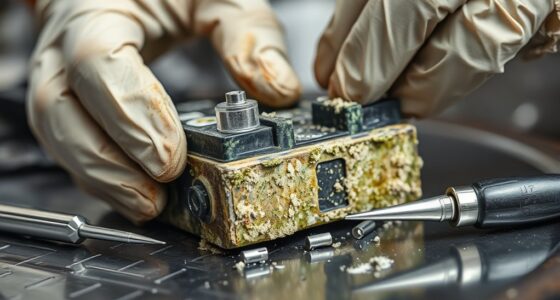Car batteries usually last between 3 to 5 years, depending on several factors like climate and driving habits. In hot areas, they might only last around 3 years, while colder climates can extend the lifespan. Frequent short trips can lead to undercharging, which can age the battery faster. To maximize longevity, keep an eye on the battery's condition with regular testing every 3 to 6 months, maintain clean terminals, and secure the battery to minimize vibrations. Being aware of warning signs can help you catch potential issues early. Discover even more tips for extending your battery's life.
Key Takeaways
- Car batteries generally last 3 to 5 years, with lifespan affected by climate and usage patterns like frequent short trips.
- In hot climates, batteries may last around 3 years, while cold climates can extend life to 5 years or more.
- Regular maintenance, including testing every 3 to 6 months, can prolong battery life and prevent unexpected failures.
- Signs of a weak battery include slow engine cranking, dimming headlights, and a swollen battery case, especially for batteries over 3 years old.
- Choose quality batteries with appropriate specifications and opt for those with extended warranties to ensure reliability and performance.
Average Lifespan of Car Batteries
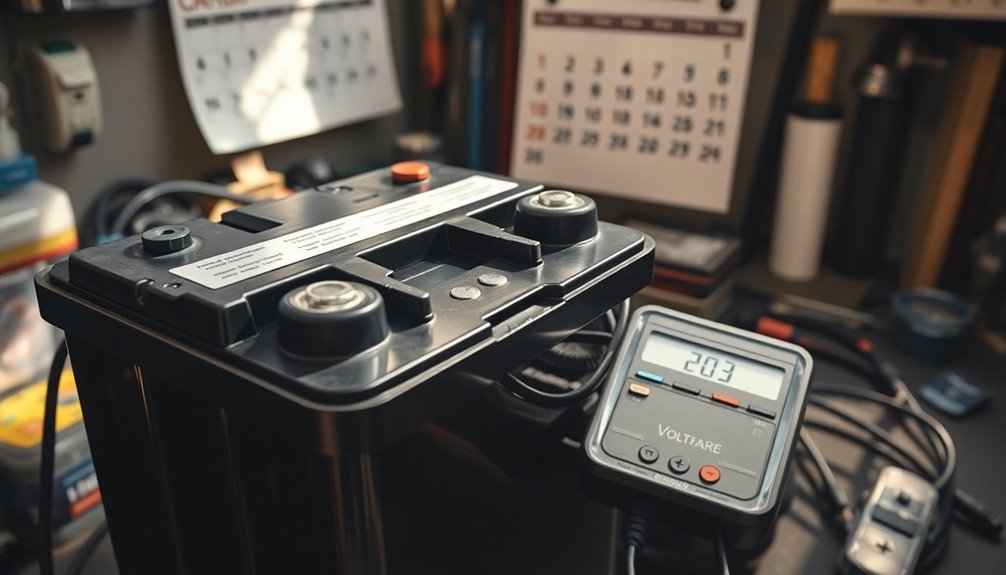
When it comes to car batteries, understanding their average lifespan is essential for maintaining your vehicle's reliability. Typically, an average car battery lasts between three to five years, influenced by usage and maintenance.
In hotter regions, expect a shorter car battery life, often around three years, while colder climates can extend the battery's lifespan up to five years or more. Frequent short trips may lead to undercharging, which can accelerate battery aging and necessitate a car battery replacement sooner than expected.
To maximize longevity, engage in regular maintenance, such as cleaning terminals and verifying your charging system functions properly. Seasonal testing is also recommended for batteries over three years old to guarantee peak performance and reliability.
Factors Influencing Battery Life
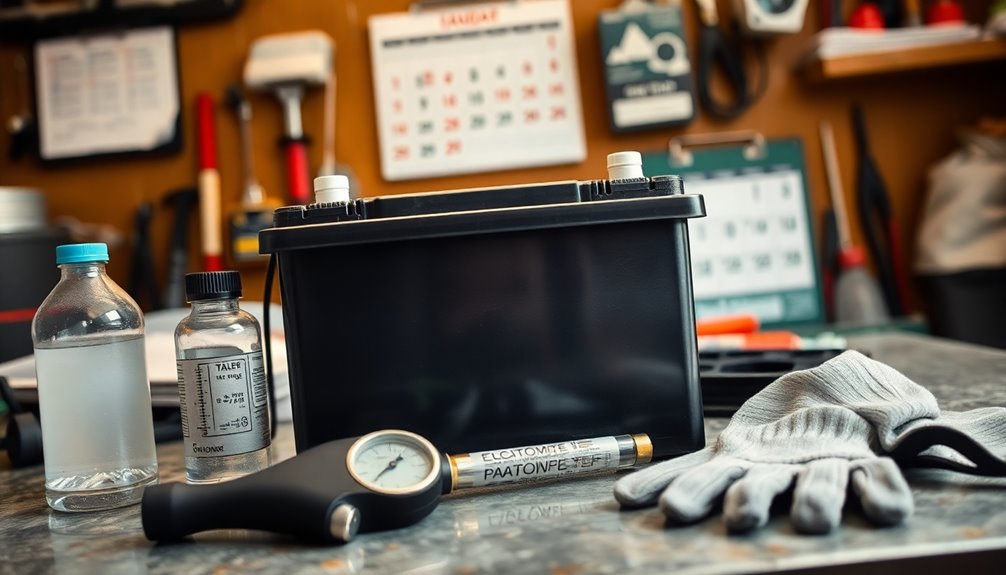
Several factors influence the lifespan of your car battery, and understanding them can help you maximize its performance. Here are key elements to evaluate:
- Extreme Temperatures: Both heat and cold can drastically shorten battery life, sometimes under two years in severe heat.
- Frequent Short Trips: Regularly taking short trips prevents the battery from fully charging, leading to sulfation and premature aging.
- Premium Batteries: Investing in quality batteries like AGM or lithium-ion can extend your battery lifespan to 6-8 years with proper care.
- Maintenance Practices: Routine inspections and terminal cleaning can help mitigate wear and prolong overall battery longevity.
Common Causes of Battery Failure

Understanding the common causes of battery failure can help you avoid unexpected breakdowns. One major issue is battery drain, often caused by electronic devices or leaving lights on when your vehicle's off.
Extreme temperatures also play a role; cold weather slows chemical reactions, while heat accelerates corrosion, both leading to premature battery failure.
Corrosion at the terminals can hinder charging, reducing performance. The average lifespan of a car battery is 3 to 5 years, but factors like significant vibrations from rough driving conditions can damage the battery's internals, contributing to structural failure.
Staying aware of these issues can extend your battery's life and keep your vehicle running smoothly.
Signs of a Weak Battery
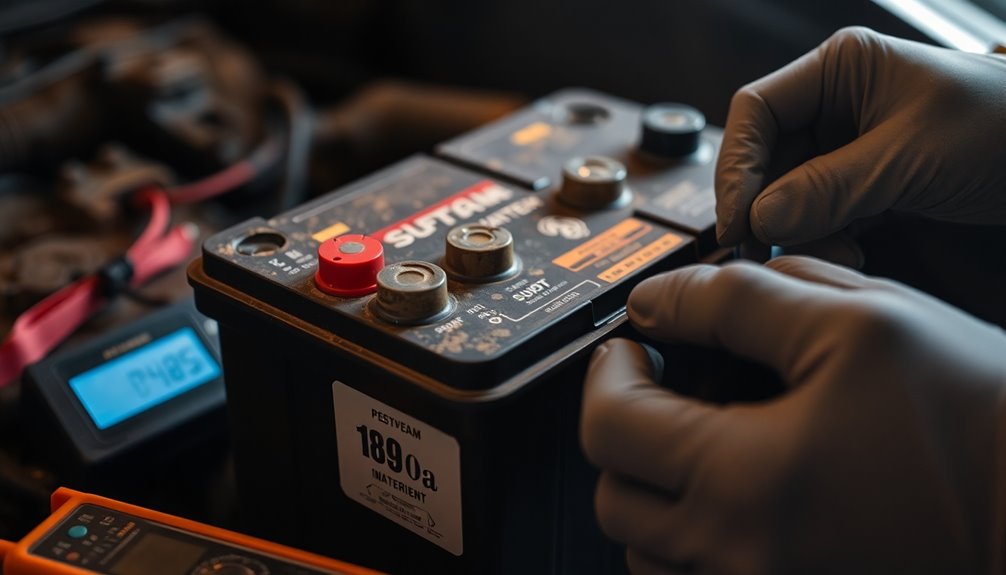
If you notice your engine cranking slowly or your headlights dimming while idling, it might be time to check your battery.
A swollen battery case can also signal serious issues that shouldn't be ignored.
Staying alert to these signs can help you avoid being stranded with a dead battery.
Slow Engine Cranking
A sluggish engine can be a telltale sign of a weak battery, especially when you notice the starter motor struggling to crank. If your engine struggles to start, pay attention to these signs:
- Frequent slow cranking: If the starter motor hesitates, it's time to check your battery.
- Age of the battery: Batteries over three years old are prone to failure and may need testing.
- Jump-starts required: If you find yourself frequently needing jump-starts, your battery's service life is likely nearing its end.
- Battery replacement: Regularly experiencing slow cranking signals that a battery replacement might be necessary, as most batteries last only three to five years.
Don't ignore these indicators; they could save you from getting stranded.
Dim Headlights Indication
Slow engine cranking often points to a weak battery, and dim headlights can be another indicator of battery issues. If you notice your headlights dimming while idling, it could mean your battery isn't supplying enough power to the electrical system. Headlights that brighten when you rev the engine suggest a failing battery needing inspection.
| Signs | Implications | Action Needed |
|---|---|---|
| Frequent dimming | Aging battery | Test or replace battery |
| Dimming with accessories | Possible charging system issues | Inspect charging system |
| Lights flickering | Weak battery or connection issues | Check connections |
| Over 3-5 years old | Higher risk of sudden failure | Schedule inspection |
Pay attention to these signs to maintain your battery's lifespan.
Swollen Battery Case
Noticing a swollen battery case can be alarming, as it often signals overheating issues that could lead to battery failure. This swelling indicates internal pressure buildup, which can compromise your battery's integrity and overall vehicle performance.
If you spot a bulging battery, it's essential to act quickly.
Here are some steps to keep in mind:
- Conduct regular visual inspections to check for swelling.
- Monitor charging habits to avoid excessive charging that leads to overheating.
- Be aware of battery lifespan; replace batteries older than three to five years.
- Address leaks immediately, as they can release harmful acids that damage your vehicle.
Timely replacement of a swollen battery case is critical to guarantee safety and maintain peak performance.
Tips to Extend Battery Life
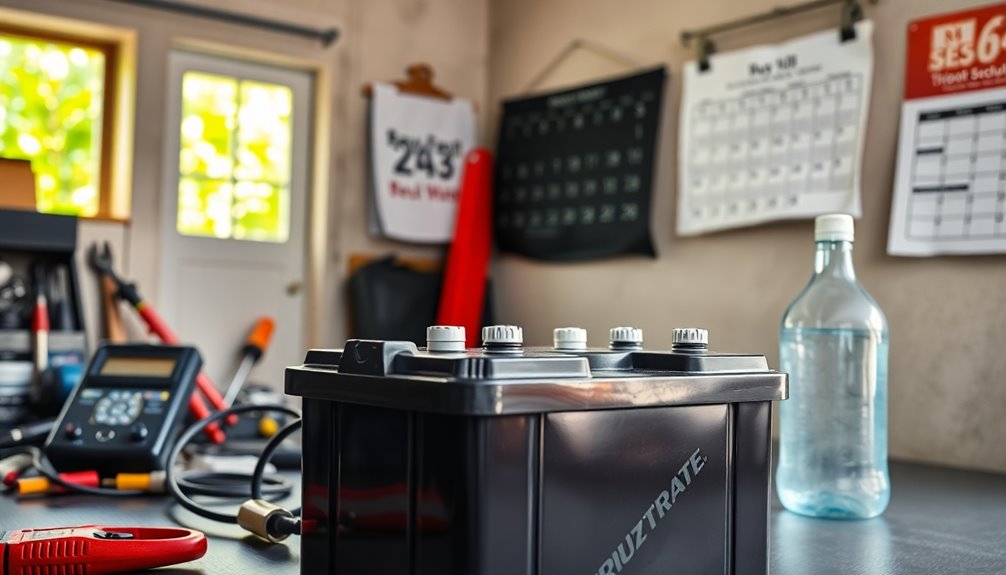
To extend your car battery's life, regularly test its condition, especially if it's over three years old.
Keeping the terminals clean is essential, as corrosion can prevent proper charging.
Regular Battery Testing
Regular battery testing every 3 to 6 months is essential for maintaining your car battery's health and performance. This practice helps you monitor the health of your battery and guarantees it remains a fully charged battery, especially as temperature fluctuations can affect its longevity.
Here are some tips:
- Use a multimeter to check the voltage; a healthy battery should read around 12.6 volts or higher when off.
- Schedule seasonal testing, particularly for batteries older than three years.
- Take advantage of free testing services at automotive stores or service centers.
- Regularly assess battery performance to catch potential issues early.
Clean Terminal Connections
While it might seem minor, keeping your battery terminals clean is vital for extending your car battery's life.
Regularly cleaning battery terminals prevents corrosion, which can hinder electrical connections and reduce charging efficiency. Look for that white, ashy substance—it's corrosion that can lead to starting issues if left untreated.
A simple mixture of baking soda and water can help neutralize and clean the corrosion; just remember to rinse with water afterward.
After cleaning, verify the battery terminals are securely fastened to minimize vibrations that could damage the battery.
Incorporating terminal cleaning into your routine vehicle maintenance can greatly extend battery life and improve overall vehicle performance.
Don't overlook this essential task!
Importance of Regular Maintenance
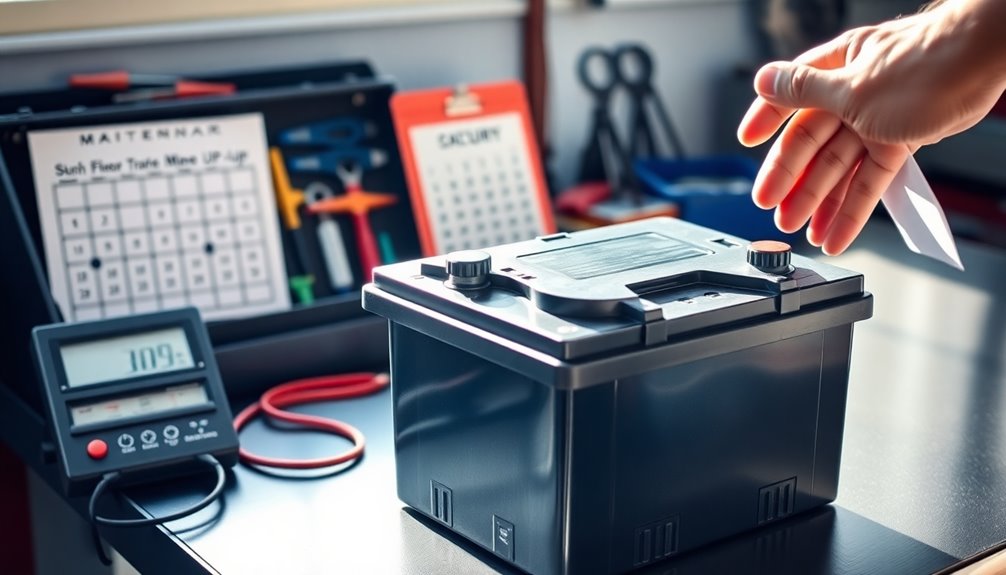
Maintaining your car battery is crucial if you want to avoid unexpected failures and extend its lifespan. Regular maintenance is key to guaranteeing your battery operates efficiently. Here are some critical practices:
- Clean Battery Terminals: Regularly check and clean terminals to prevent corrosion, which can hinder performance.
- Use a Battery Tester: Test your battery's condition annually, especially if it's over three years old, to catch potential issues early.
- Secure Fastening: Confirm the battery is securely fastened to minimize vibrations that can damage internal components.
- Routine Inspections: Look for signs of wear, like bulging or leaks, to replace the battery before it fails.
Consider using a battery maintainer during long periods of inactivity to keep charge levels stable and prolong battery life.
Proper Battery Specifications
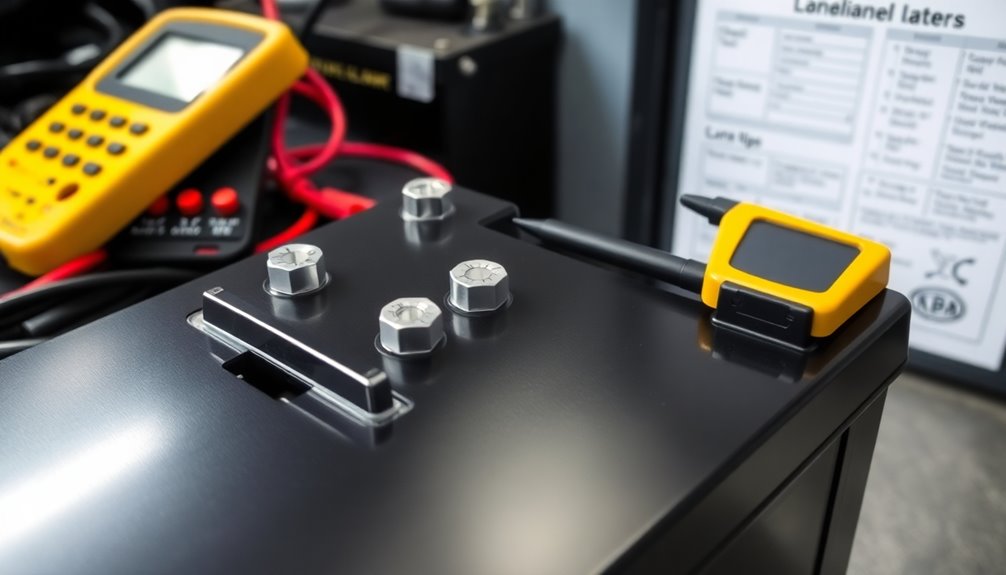
Choosing the right battery for your vehicle is essential for guaranteeing ideal performance and longevity. Start by checking the proper battery specifications in your owner's manual; this guarantees that you select the correct type, size, and terminal configuration.
Look for cold cranking amps (CCA) and amp-hour (Ah) ratings that match your vehicle's needs. If you're considering lead-acid batteries or premium AGM options, make sure they meet the original specifications.
Using a car battery tester can help you assess the current battery's performance. When it's time for a replacement, stick with reputable brands that fit the group number required for your vehicle. This aids in maintaining reliability and prevents potential damage to your electrical system.
Don't forget a quality battery charger for maintenance!
Quality Considerations for Purchase
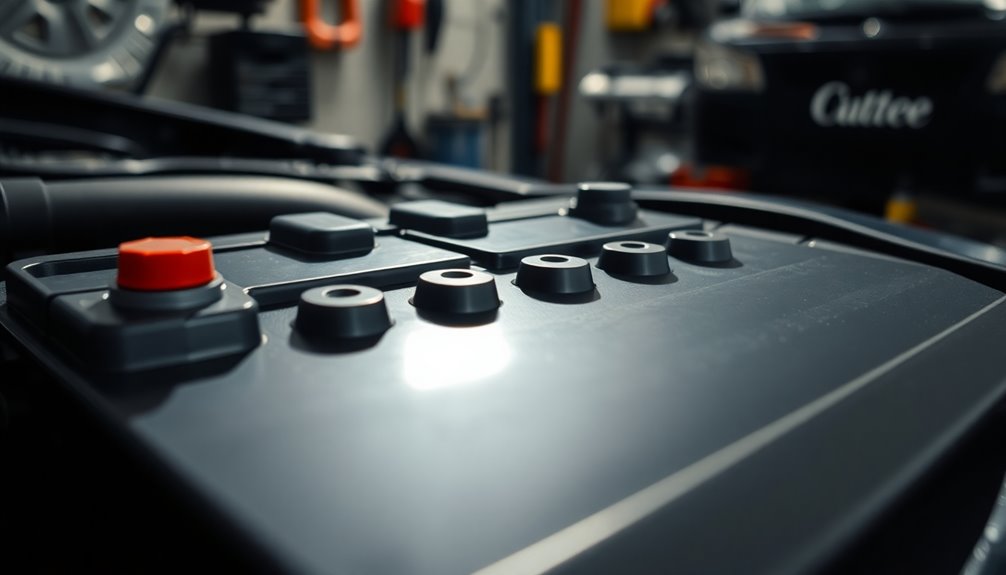
When you're ready to purchase a car battery, it's crucial to prioritize quality to guarantee reliability and longevity.
Consider these key quality considerations for purchase:
- Reputable Brands: Stick with well-known brands and high-volume sellers to guarantee fresh stock.
- Extended Warranties: Look for batteries with three or more years of warranty, indicating manufacturer confidence.
- Cold Cranking Amps (CCA): Check CCA ratings to guarantee your battery can start your vehicle in cold conditions.
- Group Number: Verify the battery's group number for proper fit and terminal configuration.
Additionally, if your battery is older than three years, conduct annual tests for performance monitoring to prevent unexpected failures.
Prioritizing these factors will help you make a smart investment.
Safe Disposal of Car Batteries
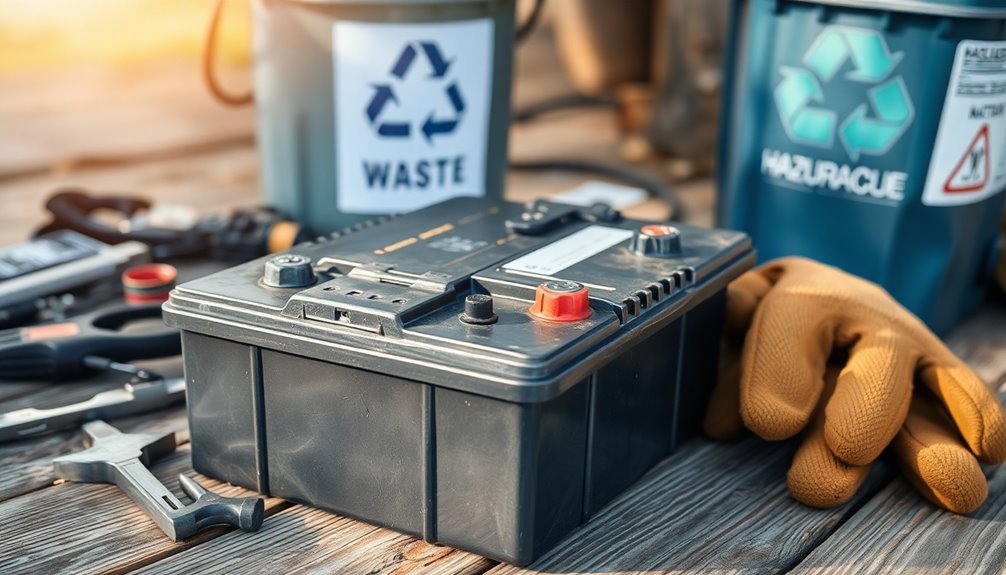
After investing in a quality car battery, it's important to think about how to dispose of it properly when it's time for a replacement.
Car batteries contain hazardous materials like lead and sulfuric acid, so safe disposal is essential for environmental safety. Many auto parts stores and recycling centers offer recycling programs where you can drop off your old battery for proper disposal.
Remember, it's illegal in many places to throw car batteries in the regular trash due to their toxic components, which can contaminate soil and water. Always check local regulations to verify compliance with safe battery disposal practices.
Plus, some retailers may even give you a discount or credit towards a new battery when you return the old one.
Frequently Asked Questions
What Is the Normal Life Expectancy of a Car Battery?
The normal life expectancy of a car battery usually ranges from 3 to 5 years.
However, this can vary based on several factors like climate, your driving habits, and how well you maintain it.
If you live in an area with extreme temperatures or neglect regular checks, you might find your battery lasting only 2-3 years.
To guarantee longevity, keep an eye on its condition and replace it when necessary.
How to Know if a Car Battery Needs to Be Replaced?
You're driving home one night, and your headlights flicker—a sign your battery might be struggling.
To know if it needs replacing, watch for slow engine cranking, dim lights while idling, or frequent jump-starts.
If you spot corrosion on the terminals or a battery warning light on your dashboard, it's time to act.
Also, if it can't hold a charge, don't wait; replace it for reliable performance.
What Shortens Car Battery Life?
Extreme temperatures, frequent short trips, and rough driving can really shorten your car battery's life.
High heat evaporates battery fluids, while short trips prevent a full charge, leading to sulfation.
Vibration from bumpy roads damages internal components, too.
Don't overlook corrosion at the terminals; it can hinder charging efficiency.
Ultimately, remember that age matters—most batteries decline steadily after a few years, so keep an eye on maintenance to extend their lifespan.
How Do I Prolong the Life of My Car Battery?
To prolong your car battery's life, regularly test its condition, especially after three years.
Keep it securely fastened to avoid vibrations that can cause damage.
During long periods of inactivity, use a battery maintainer to stabilize charge levels.
Clean the terminals to prevent corrosion, which can hinder performance.
Ultimately, drive your vehicle for longer periods instead of frequent short trips, allowing the battery to recharge effectively and promoting longevity.
Conclusion
So, you think your car battery's invincible, huh? Just like that trusty umbrella that crumples at the first raindrop, your battery won't last forever. By understanding its lifespan and taking some simple care steps, you can avoid those shocking moments when you turn the key and nothing happens. Remember, a little maintenance goes a long way—after all, you wouldn't want your car to call it quits just when you're ready to hit the road.





